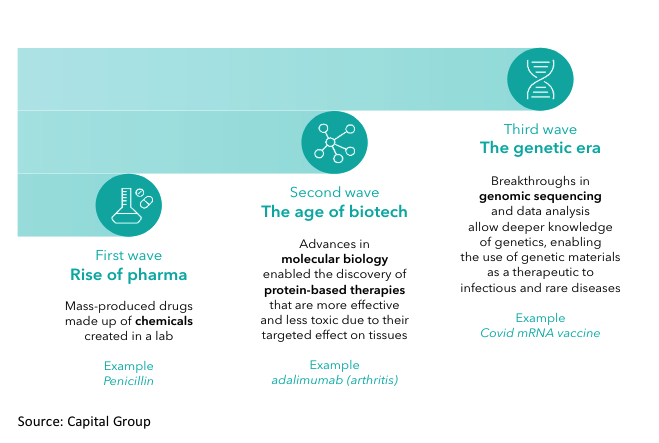This article is adapted from information provided by Capital Group.
Capital considers that biopharma is in the midst of a 'third wave' of innovation. Referring the picture above, the first two waves were:
1.. Chemistry - simple compounds created in labs - that could address everyday sicknesses and illnesses.
2. Biotech - moving from largely inorganic to organic chemistry - molecular biology. this created therapies that are more effective and less toxic, due to their targeted effect on tissues.
3. Genetic - using genomic sequencing and data processing to develop and apply highly specific and precise interventions such as gene therapy and gene editing.
The third wave of 'genetic' combines with the introduction and use of Artificial Intelligence (AI). It is possible that by using AI the current 90% failure rate of experimental medicines could be reduced significantly, leading to 50 additional novel therapies in the next 10 years.
Some examples that are already on the radar are (with example companies in square brackets)
Obesity - GLP-1 drugs - [Novo Nordisk]
GLP-1 drugs work to stimulate the release of insulin in the pancreas, which along with other effects lead to reduce food intake. Some brand names are Wegovy, Ozempic.
The potential to reduce the chronic metabolic diseases associated with obesity which lead to an estimate that more than five million people globally die from diseases linked to obesity could be a huge game-changer for our world.
Capital believes the the current enthusiasm for the impact of these drugs is still in the early stages of a 'very long runway' for this drug's potential. It is currently administered by injections, but there are a number of companies working on easier to administer solutions.
As well as saving lives, the impact on the global healthcare system from reduced weight and as a result reduced chronic kidney diseas, diabetes, peripheral artery disease, cardiovascular diseases and other associated conditions is huge, potentially changing where the healthcare system will need to put it's resources in the future.
Cancer - ADC's - [ AstraZeneca]
Antibody Drug Conjugates or ADC's are 'heat-seeking' missiles with a chemotherapy attached to an antibody. This is aiming to have much more targetted chemotherapy treatment. This is a market estimated to be worth over $250bn (US) by 2030 and AstraZeneca are concentrating on this and other oncology treatments.
Cognitive Impairment - Alzheimers - [Eli Lilly]
Work is being done based on monclonal antibodies (Donanemab), which binds to the harmful protein amyloid (which is thought to be toxic to brain cells and builds up in the early stages of Alzheimers disease).
This treatment is a so-called 'disease modifying' treatment that is designed to tackle the underlying illness. It is still in study stage, but the results are very encouraging.
Pain - [Vertex Pharmaceuticals]
Severe Pain affects more people than diabetes, heart disease and cancer combined. Having experienced the negative impacts of Opiods (which tell the brain that the pain doesn't matter), research is now being carried out to develop drugs that block the signal in the peripheral nerves outside the central nervous system, targeting the source of the brain, with potentially less side effects than current solutions.
Platform Technologies - [Alnylam Pharmaceuticals]
These are fundamental scientific discoveries that change our understanding of biology or engineering interventions and provide more tools to understand and intervene with human disease. One example is RNA interference - which was used in Covid vaccines. This science provides the ability to 'disrupt the signal between the DNA in human cells and proteins which means that we can now 'cut off' the signal to these proteins.


